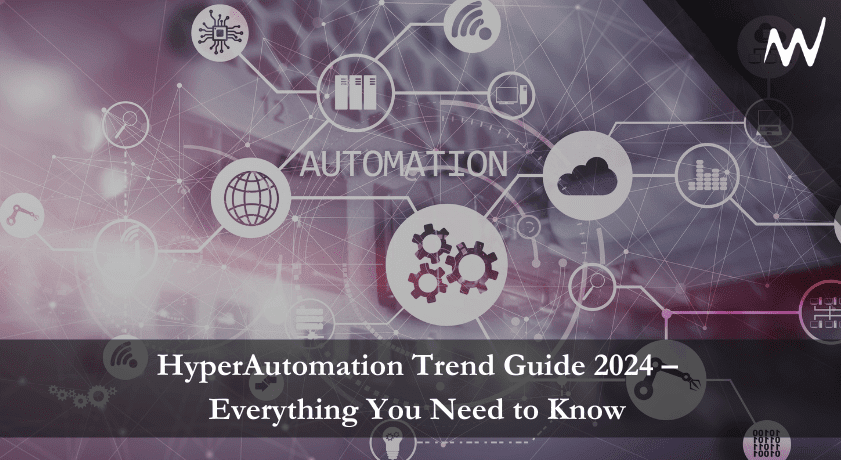
Introduction:
Imagine your business operations as an assembly line, where each task is seamlessly managed by advanced machines and robots equipped with artificial intelligence (AI), machine learning, and robotic process automation (RPA).
Welcome to the era of Hyperautomation AI, a supercharged version of traditional automation, set to redefine how businesses operate.
What is Hyperautomation AI?
Hyperautomation AI is a comprehensive approach leveraging integrated technologies, such as AI, machine learning, and natural language processing, to enhance human capabilities and automate various business processes.
This holistic strategy involves tools like Event Management Software, Business Process Management (BPM), Intelligent Business Process Management Suite (IBPMS), Integration Platform as a Service (IPaaS), and more.
Benefits of Hyperautomation AI:
Cost Savings and Resource Allocation: Hyperautomation reduces the need for manual intervention in repetitive tasks, leading to significant cost savings. This allows organizations to reallocate budgets towards strategic planning, innovation, and growth.
Error Reduction and Accuracy: Automation minimizes the risk of human error in tasks such as data analysis, auditing, and processing, ensuring more reliable and consistent results critical for decision-making and compliance.
Quick Decision Making and Response Time: Real-time data processing and analysis enable companies to make swift decisions and respond instantly to customer inquiries or market changes, enhancing overall efficiency.
Improved Customer Experience and Personalization: Automation technologies, including chatbots and CRM systems, enhance customer experience by providing immediate responses and utilizing data analytics for personalized interactions.
Examples of Hyperautomation in Manufacturing:
Workflow Simplification: Hyperautomation in customer service programs utilizes AI-powered chatbots to solve frequently asked questions, freeing up human representatives for more complex issues. Real-time customer data analysis enables personalized experiences at scale.
Enhancing Data Processing and Analysis: Hyperautomation plays a crucial role in data management, automating tasks like data entry and validation through RPA. Machine learning algorithms analyze big data for meaningful insights, accelerating decision-making processes.
Supply Chain Management: Hyperautomation revolutionizes supply chain management by enabling real-time monitoring of inventory levels, automatic rescheduling, and dynamic adjustment of production schedules based on market demand forecasts.
Predictive Maintenance: IoT sensors and predictive analytics under Hyperautomation revolutionize warehousing, anticipating device failures, improving maintenance efficiency, and reducing downtime.
Top Hyperautomation Use-Cases:
Hyperautomation in Healthcare: Streamlining administrative tasks, increasing patient engagement, personalized treatment planning, and predictive analytics for preventive care are some ways Hyperautomation is transforming the healthcare industry.
Hyperautomation in Retail: Dynamic inventory management, AI-powered marketing, responsive chatbots, and enhanced security measures are reshaping the retail space through Hyperautomation.
Hyperautomation in Recruitment: RPA handles a significant portion of the recruitment process, reducing HR workload. Chatbots engage candidates, and data analytics fine-tune the talent pipeline, improving accuracy and speed of hiring.
Hyperautomation in Financial Services: AI, RPA, and data analytics optimize processes in finance, including KYC compliance, fraud detection, and loan underwriting. Predictive analytics prepares investment strategies to enhance client results.
Hyperautomation in Sales: AI-powered lead scoring, chatbots for customer interaction, and automated follow-up processes transform the sales industry, optimizing CRM systems and improving overall customer satisfaction.
Hyperautomation in Industrial: Utilizing IoT sensors and AI for predictive maintenance, RPA for supply chain management, and automation in production processes, Hyperautomation enhances productivity and quality control in the industrial sector.
Overall, Hyperautomation is set to be a game-changer across various industries, driving efficiency, reducing costs, and transforming the way businesses operate. As the hyper-automation AI market is projected to exceed US$155 billion by 2032, businesses embracing this trend are poised for a future of increased innovation and growth.
To learn more, talk to our experts today. Book your free consultation now!
You may also connect with us by mail at info@wrinom.com.
